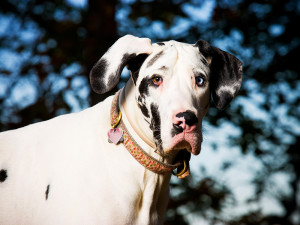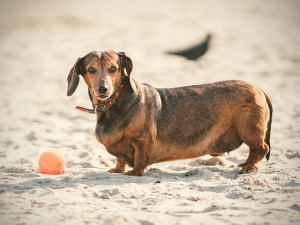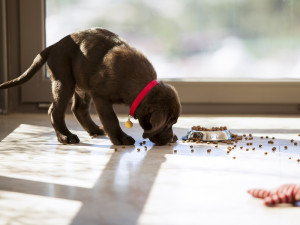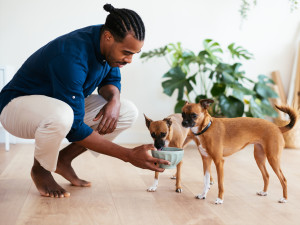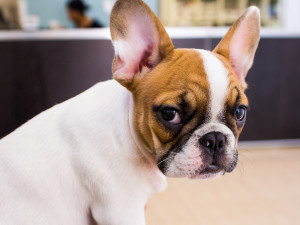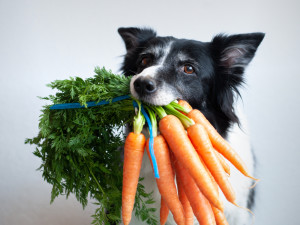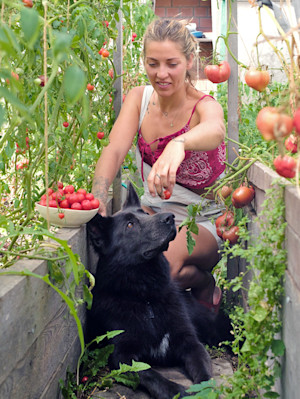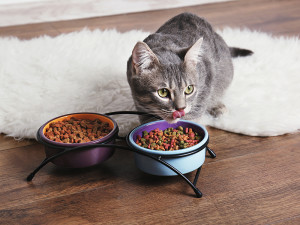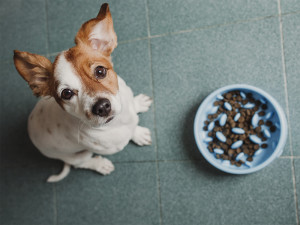Can Your Endlessly Hungry Dog Tell When They’re Full?
They seem to be bottomless pits, but something has to to tell them when to stop... right?

Share Article
Night after night, it’s the same. You get in from your evening walk, unclip the leash, and watch as the dinner show begins. Your dog is jumping around, barking and excited for the meal to come. Maybe it’s kibble, or maybe it’s fresh food, but whatever it is, they’re ready to chomp and chew until every last bite is gone. But at some point, in between pouring the food into their bowl and watching them lick up every last morsel, you start to wonder how much chow you’d have to pour into the bowl for them to realize enough is enough.
Can dogs actually tell when they’re full, or are they simply eating machines with no sense of self control? We consulted with two veterinarians to dig into all of our questions about why dogs overeat.
Do dogs know when they’ve eaten enough?
It turns out, the answer is a bit complicated. Dr. Wendy Mandese, a clinical professor of primary care and dentistry for the University of Florida’s College of Veterinary Medicine, tells us that just like people, “dogs have stretch receptors in their stomach that will send a satiety signal to the brain.”
At the same time, Dr. Claudia Kirk — a board-certified veterinary nutritionist and small animal internal medicine specialist who founded the University of Tennessee’s veterinary nutrition department — cautions in a separate email interview that the concept of being “full” is “a bit of a human description of becoming sated or meeting energy needs.”

According to Mandese, “While some dogs can self-regulate when free-fed, many will overeat, and food left down can lead to resource guarding with other dogs.”
Those of us who’ve caught our dogs eating forbidden objects like socks know firsthand that dogs are not always the most judicious about their dietary choices; it’s up to us to keep them safe.
Why do dogs overeat?
To some degree, it’s in their nature. Dr. Kirk notes that dogs have been described as “bolt-feeders,” which means that they tend to wolf down their food so quickly that they bypass the signals that tell their body they’ve eaten enough. (If you’ve got a dog who eats too fast, we’ve got a few tips that can help.)
Just like humans can eat so fast that we don’t notice our own physiological signals until it’s too late, dogs can (and, in some cases, are designed to) do the same.
When you think about how dogs evolved over time, it makes sense; eating quickly would have been advantageous to dogs’ wild ancestors. “As scavengers and pack animals,” Dr. Kirk points out, “it is advantageous to gobble up your share of the food before your neighbor or a competitor comes to take it away.” Perhaps because of this, dogs tend to eat more in the company of other animals.
The type of food a dog receives can contribute to overeating as well, Dr. Kirk says. Some dog foods are so energy dense that dogs who consume them can wind up taking in more calories than they initially realize. In other cases, the food might be so tasty that dogs (again, like humans) simply cannot help themselves. Offering a variety of foods at mealtime can encourage a dog to overeat for the same reason.
Drs. Kirk and Mandese both note that a dog’s medical conditions could play a role in their dietary habits. Some medications and diseases, like hyperadrenocorticism (Cushing’s disease), can stimulate an increased appetite. If you notice a significant increase or decrease in your dog’s appetite, Mandese suggests consulting with a veterinarian to rule out any possible underlying conditions.
And finally, there’s the element of human error. Often, dogs’ over-indulgent eating habits can stem from loving pet parents who “overfeed their dog as a sign of affection and may not recognize their pet is becoming overweight or obese over time,” Dr. Kirk says.
Are some dog breeds more likely to overeat than others?
According to Dr. Mandese, overeating is not related to any specific breed. Beyond the usual contributing factors, overeating likely has more to do with your dog’s personality and previous experiences with food security.
“Previous starvation or the need to compete for food may cause dogs to eat more than necessary in preparation for future deprivation of food,” she says.
How does overeating affect dogs’ health?
Chronic overfeeding can lead your dog to become overweight or obese. Per Dr. Kirk, dogs with weight management issues are more prone to health problems including arthritis and mobility issues, cancer, heart disease, urinary tract disorders, skin infections, and breathing difficulty. They’re also at risk for a shorter life expectancy.
Dogs who normally eat a healthy amount but suddenly consume way too much food might face more acute symptoms including vomiting, regurgitation (aka, throwing up undigested food — yummy), or diarrhea. They could refuse food, begin panting or pacing, or feel bloated and lethargic. In some cases, they may refuse food altogether.
In more severe cases, Dr. Kirk warns, sudden overeating can cause life-threatening disorders like pancreatitis, GI Bloat, and/or or gastric torsion — also known as a gastric dilation and volvulus (GDV).
“A GDV is an acute emergency,” Dr. Kirk warns. “It is more typical in large breed dogs. While many dogs will develop a GDV without overconsumption of food, feeding practices and sudden access to a large volume of food may predispose dogs to this condition.”
What should I do if my dog has overeaten?
Dr. Kirk advises that pet parents whose dogs begin showing the symptoms listed above should seek veterinary advice.
“It is important to remember that some of the consequences like GDV and pancreatitis are deadly and need immediate treatment,” she says. “The best course of action is to avoid overfeeding by feeding an appropriate amount to the dog’s age, breed, and energy level. Control uncontrolled food access by closing cupboards, feed containers, garbage cans, or other sources of unlimited food.”
How do I stop my dog from eating too much?
Both Drs. Kirk and Mandese urge all pet parents to speak with their veterinarians to learn how many calories their dogs should actually consume each day and come up with a feeding plan.
Your dog’s ideal weight and nutritional demands will depend on their age, breed, gender, activity level, and lifestyle. “Keep in mind that calorie needs can change over time,” Dr. Kirk says. “Aging and a sedentary lifestyle will lower the calorie requirements, just like in people.”
Mandese advises that pet parents should divide their dogs’ caloric needs across two to three meals over the course of the day. Depending on your dog’s eating habits, she adds, you might want to adjust how you dole out their meals.
And as tempting as it might be to feed your dog table scraps during holidays like Thanksgiving and Christmas, Dr. Kirk warns that overdoing it can have dire consequences. During these times of year, she says, “veterinary emergency rooms commonly see very sick pets after the pets overindulgence on fatty foods like turkey with skin, gravy, and other fatty foods.”
Long story short: We all love to eat, but our dogs might struggle to know when enough is enough. It’s important for pet parents to pay attention to our dogs’ nutritional needs so that they can feast on everything life has to offer for as long as possible.

Laura Bradley
Laura is a New York-based experienced writer and mom of two rescue pups. Her work has appeared in Slate, Vanity Fair, Daily Beast, The Washington Post, The Atlantic, Yahoo! News, Vulture, Grazia Magazine, and more. When she is not writing or walking the pooches, you will probably find her in the community garden.
Related articles
![French bulldog puppy looking scared at vet]()
10 Things to Ask at Your First Vet Visit
There are no stupid questions — well, when it comes to your dog’s health.
![Close Up Of Female Owner Feeding Border Terrier Puppy With Dry Dog Food At Home.]()
The Ultimate Guide to Your New Dog’s Nutrition
From kibble to homemade food, these tips will help you learn the fundamentals of dog nutrition.
![Dog biting into a bunch of carrots]()
How to Get Your New Dog the Vitamins and Minerals They Need
Your pup needs their greens, too.
![Woman in the garden with her large black dog.]()
Dogs Can Thrive on a Plant-Based Diet, a Study Says—But Is It Actually Good For Them?
Everything you need to know about the pros and cons of a veggie diet.
![Grey cat at looking up from eating on floor at home]()
Gut Feelings: How to Balance Your Pet’s Microbiome
The mind-gut connection isn’t just for people. Your dog or cat’s gut microbiome plays a big role in their health and well-being.
![Puppy looks up while sitting next to a puzzle toy with food.]()
How to Slow Down a Dog Who Eats Too Fast
Plus 6 stylish slow-feed dog bowls.
